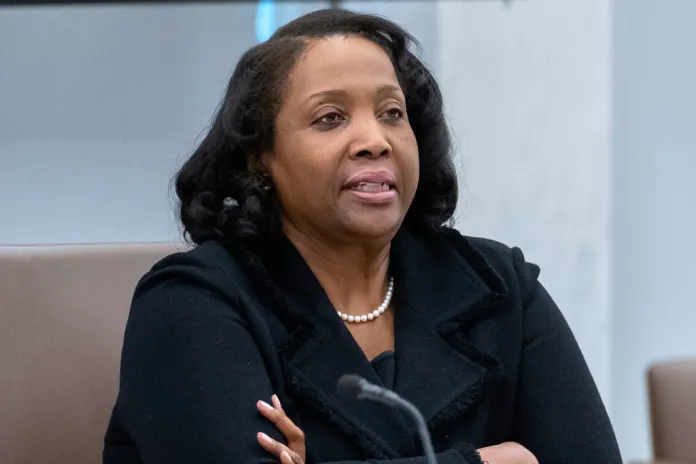Analysis-Financial or price stability? Fed faces calls to pause
Amidst the ongoing banking crisis in the United States and Europe that has caused turbulence in global markets, some financial industry executives are urging the Federal Reserve to pause its monetary policy tightening for the time being. However, these same executives have recommended that the central bank should be prepared to continue raising rates again later.
Currently, investors are predicting a 60% chance that the Fed will increase rates by 25 basis points on Wednesday, while the remaining 40% is betting on no change. Some industry executives have stated that the central bank should prioritize financial stability at present.
According to Peter Orszag, CEO of financial advisory at investment bank Lazard Ltd, the Fed should focus on strong and quick financial stability while proceeding with caution on price stability. Orszag also suggested that the Federal Reserve should put a hold on raising rates despite being ready to do so again later. However, the central bank did not give a statement regarding Orszag’s proposal. During their pre-meeting, Federal Reserve officials are prohibited from commenting on monetary policy or the economic outlook.
The Federal Reserve has significantly increased interest rates in the past twelve months to suppress inflation. The rate of acceleration is unprecedented since the 1980s. The European Central Bank, along with other organisations, joined in the rate hike by raising their rates by 50 basis points earlier last week.
The quicker-than-expected rate change is affecting global markets as other countries follow suit. Some US banks have failed recently, while others are undergoing immense pressure. At the same time, Credit Suisse, a Swiss lending institution, is endeavouring to complete a rescue deal this weekend. The tumult within the banking sector has created volatility among asset prices. As a result, US government bond yields are falling, causing problems among investors who claim that exponential price changes make it harder to trade. Despite consequences, the S&P 500 managed to stay stable despite steep losses in bank shares.
While some experts advocate for a sustained pause, others suggest that this could ignite worries that consumer prices will rise once more. Recent US economic data is giving the Federal Reserve little reason to believe that inflation is being controlled. Consumer prices rose at a 6% annual rate in February, which is nearly three times the central bank’s target. Discouragingly, there have been minimal signs of significant easing in hiring and wage growth.
Senior economist Bob Schwartz at Oxford Economics wrote in a note that while the banking emergency is worth attention, he believes that it is not a systemic issue but rather a liquidity problem that the Federal Reserve can remedy with its lending facilities. Nonetheless, Schwartz added that the “wild card” will be how the market reacts to the Fed’s actions.
James Tabacchi, CEO of broker-dealer South Street Securities, thinks that the Fed will eventually need to go above 6%, considering himself an inflation hawk. Tabacchi suggests that the Fed should pause in its rate hike temporarily, saying, “What will it hurt to wait a month and say, ‘We’d like to see the market stabilise?’”
Peter Orszag, who served as the Director of the Office of Management and Budget during the Obama administration, suggests that the Fed has time as long as long-term inflationary expectations remain unchanged. Raising rates too quickly could only worsen the situation as the current banking crisis illustrated. Orszag further noted that various factors indicate that the pandemic has affected inflation, such as supply chain disruptions and reduced demand for travel and entertainment.
New research indicates that delivery delays might be responsible for between 30-70% of elevated core PCE inflation in the fourth quarter of 2022. Over time, this could become a “disinflationary force” this year, according to a discussion paper by Orszag and co-author Robin Brooks, Chief Economist at the Institute of International Finance.
Economist Torsten Slok at Apollo Global Management explains that the banking crisis has tightened financial conditions in markets. Slok suggests that these events could correspond to a 1.5% increase in the Fed funds rate, which would increase the risk of an economic slowdown.
BlackRock Inc strategists argue that markets now realize the damage caused by the rapid rise in interest rates, evident from the gyrations of the past week. They also believe that the trade-off for central banks between fighting inflation and protecting economic activity and financial stability is now immediately apparent.
(Reporting by Paritosh Bansal and Ira Iosebashvili; additional reporting by Dan Burns; Editing by Nick Zieminski)
“From Analysis-Financial or price stability? Fed faces calls to pause“
“The views and opinions expressed here are solely those of the author of the article and not necessarily shared or endorsed by Conservative News Daily”
" Conservative News Daily does not always share or support the views and opinions expressed here; they are just those of the writer."




